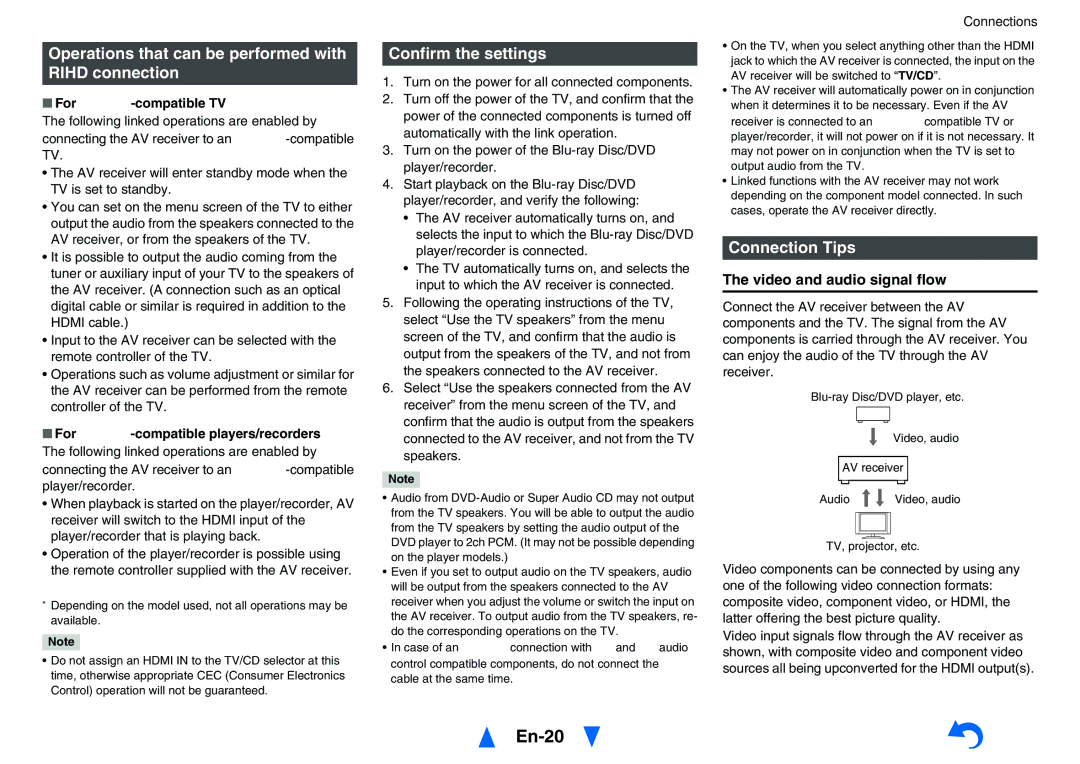
Operations that can be performed with RIHD connection
■For p-compatible TV
The following linked operations are enabled by connecting the AV receiver to an
•The AV receiver will enter standby mode when the TV is set to standby.
•You can set on the menu screen of the TV to either output the audio from the speakers connected to the AV receiver, or from the speakers of the TV.
•It is possible to output the audio coming from the tuner or auxiliary input of your TV to the speakers of the AV receiver. (A connection such as an optical digital cable or similar is required in addition to the HDMI cable.)
•Input to the AV receiver can be selected with the remote controller of the TV.
•Operations such as volume adjustment or similar for the AV receiver can be performed from the remote controller of the TV.
■For
• When playback is started on the player/recorder, AV receiver will switch to the HDMI input of the player/recorder that is playing back.
• Operation of the player/recorder is possible using the remote controller supplied with the AV receiver.
*Depending on the model used, not all operations may be available.
Note
•Do not assign an HDMI IN to the TV/CD selector at this time, otherwise appropriate CEC (Consumer Electronics Control) operation will not be guaranteed.
Confirm the settings
1.Turn on the power for all connected components.
2.Turn off the power of the TV, and confirm that the power of the connected components is turned off automatically with the link operation.
3.Turn on the power of the
4.Start playback on the
•The AV receiver automatically turns on, and selects the input to which the
•The TV automatically turns on, and selects the input to which the AV receiver is connected.
5.Following the operating instructions of the TV, select “Use the TV speakers” from the menu screen of the TV, and confirm that the audio is output from the speakers of the TV, and not from the speakers connected to the AV receiver.
6.Select “Use the speakers connected from the AV receiver” from the menu screen of the TV, and confirm that the audio is output from the speakers connected to the AV receiver, and not from the TV speakers.
Note
•Audio from
•Even if you set to output audio on the TV speakers, audio will be output from the speakers connected to the AV receiver when you adjust the volume or switch the input on the AV receiver. To output audio from the TV speakers, re- do the corresponding operations on the TV.
•In case of an pconnection with uand uaudio control compatible components, do not connect the u cable at the same time.
En-20
Connections
•On the TV, when you select anything other than the HDMI jack to which the AV receiver is connected, the input on the AV receiver will be switched to “TV/CD”.
•The AV receiver will automatically power on in conjunction when it determines it to be necessary. Even if the AV receiver is connected to an pcompatible TV or player/recorder, it will not power on if it is not necessary. It may not power on in conjunction when the TV is set to output audio from the TV.
•Linked functions with the AV receiver may not work depending on the component model connected. In such cases, operate the AV receiver directly.
Connection Tips
The video and audio signal flow
Connect the AV receiver between the AV components and the TV. The signal from the AV components is carried through the AV receiver. You can enjoy the audio of the TV through the AV receiver.
Video, audio
AV receiver
Audio ![]()
![]() Video, audio
Video, audio
TV, projector, etc.
Video components can be connected by using any one of the following video connection formats: composite video, component video, or HDMI, the latter offering the best picture quality.
Video input signals flow through the AV receiver as shown, with composite video and component video sources all being upconverted for the HDMI output(s).
